I’ll never forget the first time I saw someone eat an apple whole. I was in English class, minding my own business, when I caught my friend out of the corner of my eye devouring a honey crisp apple down to the seeds. Imagine my surprise when she blurted out, “The apple core doesn’t exist! It’s all a lie!”
Obviously, I needed to investigate further.
What I discovered was that it’s time we take control of our fruit consumption, and that starts by getting to the “core” of the problem.
Indeed, we often eat apples to their perceived core, discarding the rest. We’ve been trained to believe that there is this elusive, inedible aspect to the apples we eat everyday.
Dr. James Hamblin of The Atlantic points out the flaw in this habit. “What do you think an apple core is? What’s the thing we throw away?” Hamblin said. “It is a ghost.”
Hamblin supports the claim that eating an entire apple while leaving nothing behind is not only possible but safe, in a video he published online where he consumes the entire apple, seeds and all.
Hamblin notes that the average person discards about 30 percent of each apple they eat, and adds that the best way to eat an apple is vertically rather than horizontally — from the bottom to the top.
Additionally, our tendency to eat only parts of our apples could actually amount to a significant waste of money.
According to Hamblin, “If each of us eats an apple a day […] and we are all wasting 30 percent of our apples at $1.30 per pound, that’s about $42 wasted per person per year — which is $13.2 billion annually, thrown in the trash or fed to pigs.”
Though the estimates may not be entirely precise, eating our apples whole serves as a reminder to cut down on food waste. If we can take care to eat those extra bites of our apples, perhaps we’ll be more likely to curb wastefulness in other aspects of our lives.
Apples are also full of nutrition, including pectin, a form of fiber that lowers blood pressure and glucose levels. Apples contain vitamins A, C, E and beta carotene, all of which help reduce the risk of heart disease, asthma and diabetes. In 2008, a Cornell University study reported that bananas, oranges and apples might reduce Alzheimer’s and other neurodegenerative disorders.
When I started mentioning that eating apples whole was not only harmless, but perhaps beneficial, I was told that eating too many apple seeds could be dangerous, since apple seeds contain cyanide, which is essentially a poison. But, eating a few apple seeds along with your apple won’t harm you, as the levels of cyanide are extremely low in each seed.
So the next time you pick up an apple and start chewing, don’t be afraid to blurt out, “The apple core doesn’t exist! It’s all a lie!”
2018-05-16


